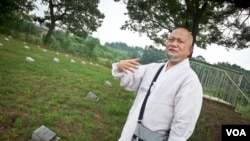Along the SFX1 Highway that runs from Seoul to the barbed wire fences of the demilitarized zone lies an all-but-forgotten cemetery.
Here rest the bodies of 769 North Korean soldiers who came to fight the South.
But Muk-gai, a South Korean Buddhist monk, does not consider them enemies.
Once they are dead, we should forgive everything they did in life, he said. He sees it as his spiritual duty to care for their souls. It is an old Eastern tradition.
The 56-year-old monk, with a shaved head and simple gray tunic, visits the graveyard once a month. He taps on a small drum as he walks past headstones that dot the hillside. He chants to ease the suffering of spirits that he said haunt the grounds.
They were among the thousands of soldiers whose remains were left scattered across the divided peninsula when the Korean War ended with a cease-fire in 1953. In 1996, South Korea’s government reburied the bodies of enemy fighters near the demilitarized zone at sites such as this in Paju.
Calls for concern
Muk-gai didn’t know much about the graveyard until three years ago, he said, when ghosts with gaping wounds and military uniforms began visiting him during his meditation. They telepathically communicated their longing for their families and their need for love, he said.
He first was scared by the spirits but got used to them, the monk said. After three months of repeated visits, he began caring for them at the cemetery.
Muk-gai said the soldiers have not aged since dying, so they still look young. He feels like they are his sons.
The Korean peninsula’s ongoing tensions might mean the North Korean remains will not be repatriated any time soon.
Some urge repatriating bodies
Some North Korean defectors now living in the South say that is a sad fate for the deceased fighters.
Like most other men in the North, 51-year-old Park Gun-ha served in his country's military. He’d like to see the bodies returned, he said. The stranded soldiers were just doing their job, he said. They didn’t choose to go to war; they were sent by their leaders, he added. Preventing their return is a political issue.
The bodies of about 400 Chinese soldiers also were buried at the cemetery until earlier this year, when they were sent back home.
In addition to the North Korean soldiers who died during the Korean War, the bodies of a few dozen men who came to fight the South many years later are buried at the cemetery. That includes commandos who tried to assassinate the South Korean president in 1968.
Pyongyang might not want those bodies back, said Korean War historian Andrew Salmon.
"I can’t speak for the North Korean government," Salmon said. "This is purely speculation on my behalf that this was a deniable operation, a black operation. So if they accept the bodies back, then they accept that they conducted the operation."
Caring gestures
Whatever the reason for their presence in South Korea, Muk-gai said he’ll continue caring for the North Koreans and their graves until there is finally peace.
People used to ask why he was caring for the enemy and tried to stop him, Muk-gai said. But he believes he has changed their minds.
Before departing the cemetery, the monk tapped out one last rhythm on his drum and bowed toward the graves.












